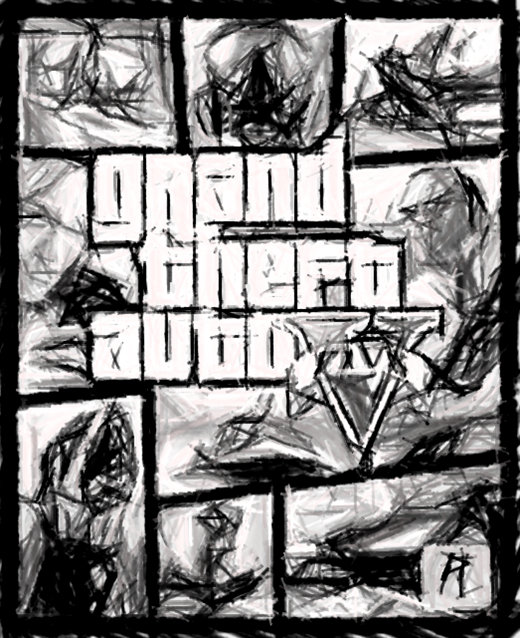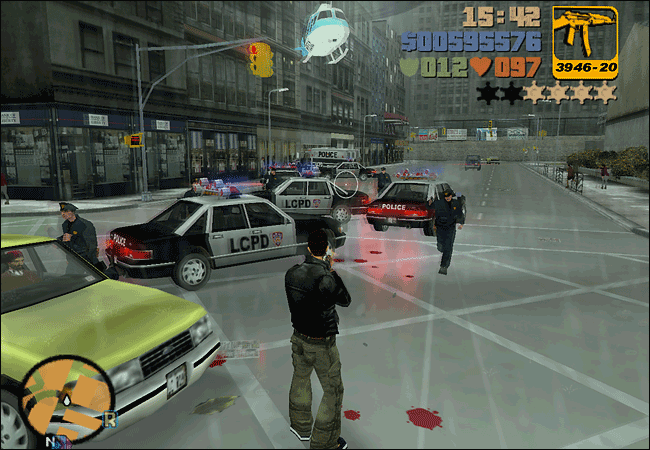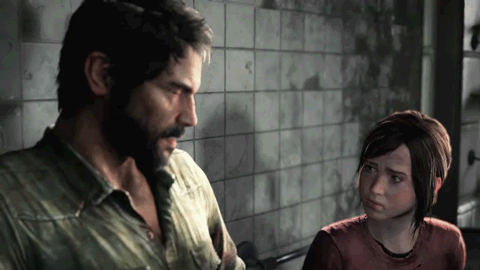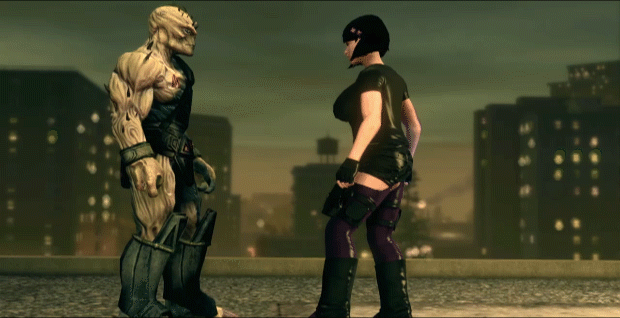
Grand Theft Auto 5, the newest installment in the best-selling video game series, was released for PlayStation 3 and Xbox 360 on Tuesday, September 19, 2013. Fans are eagerly awaiting another opportunity to visit the virtual world where that they can experience a lengthy crime saga from three difference perspectives, a new feature to the series that has built itself on dark satire that holds a cracked mirror to Americana. In past installments, the series usually achieved this through absurdism—often through player-controlled actions—film references, and pop-culture references, focused through a comedic lens, amidst regular violence.
The series first made its own pop-culture splash in 2001 with the release of Grand Theft Auto 3 for PlayStation 2 with a condensed version of a New York City stand-in to be explored. It proved to be cathartic to laugh at the game's unmasked, hyper-sardonic violence that could be embraced, uninhibited by consequence, all while experience a story where voice actors portraying facsimiles of gangsters swore out-loud in dialog. Twelve years, and multiple editions of the game later, and Grand Theft Auto 5 has released, and the joke isn't fucking funny anymore.
Grand Theft Auto Is An Industry Figure Head, And As Such, It Must Be Criticized
The Grand Theft Auto 5 story follows a weary group of protagonists that feel disenfranchised with the gilded American dream that Scottish developer, Rockstar North, explored in most all entries past. The recipe has proved successful, presenting banal, frustrated adult male characters seduced by exciting crimes, perhaps as a reflexive reaction from the developer to hold up a mirror to their audience. The series has raised the ire of pundits for its violence in the past, and Rockstar North is now, as they have previously, embraced their artistic stance, unflinchingly, as if nobody could have been so bold to never engage, or change, or attempt to evolve away from a manure-caked kiddy pool of sustained adolescence and self-pity that nobody understands how hard it is to be a white guy dealing with the lie that is the American dream, and the cunts you were supposed to trust. It should be noted that disenfranchisement and nihilism is the primary motivation for the characters running amok in this mass-audience product.
Reports reveal that the demographic lining up to buy Grand Theft Auto 5 at midnight (source: I was there) are white men over thirty years of age that still need to go to work the next morning.
Reports also reveal that Grand Theft Auto 5 has received near-universal acclaim, garnering countless perfect scores, and proving to be nigh-unassailable from a critical perspective, according to people that are old enough to have willing chosen journalism as their professions. I heard one of those journalists was called a faggot for not liking the game when his review was posted a day before the public release, scoring it 3.5/5. A woman on another site scored it a 9/10 and was threatened with rape for commenting that the game was misogynistic.
In the aforementioned review, there was confusion in the comments section over the meanings of misogyny, political bias, and professionalism in creative and journalistic capacities. It's reasonable to believe there is a muddled, limited world-view from the site's visitors to comment in such a manner.
Ironically, Grand Theft Auto Is Exactly As Great (And Cool) As It Was In 2001

GTA is like the first guy in his middle school class to sprout pubes, but the last to open a checking account and actually pay for his own utility bills. He hasn't needed to. He had pubes first. He's been living off of high-fives on the street and blowjobs in elevators—he lives in a loft in the cool part of town, and actually has great taste in music and movies.
Tragedy strikes when we understand that no good story ends with a blowjob in an elevator. We always wake up. We are not at the closing curtain. We are at the turn.
We always wake up. The must always continue.
Issues has been raised with the game's story. Some stories in books, film, and games, concern reprehensible individuals, and little else, and they can create compelling narratives in so doing. Grand Theft Auto 5 director and Rockstar North boss, Dan Hauser cited that masculinity was vital to GTA 5's story, hence the absence of playable female characters.
A person has the right to tell any joke they please. The joke's audience has the right to tell the joker if the joke is funny or not. Hauser, and Grand Theft Auto, keep telling the same joke, game after game.
"Everything sucks. Everybody sucks. Target everyone. We noticed it first."
There can be no immunity to criticism. We have to want things to get better. Masculinity is an ageless theme for storytelling, as compelling in The Departed as it was in The Odyssey. Hauser is in the right with his claim and is free to tell his story. He can explore masculinity as he understands it. His transparency and motivation should be welcomed.
Women are commonly treated with mistrust and suspicion in Grand Theft Auto games. CJ's sister, Kendl in Grand Theft Auto: San Andreas and Kate McReary in Grand Theft Auto 4 are the only compassionate female characters in the series to date.
Kate is a tragic character that can be an inadvertent casualty in the course of the story, depending on choices the player makes. Kendl barely registers in the San Andreas' story. She spends most of the game as an observer and burden on CJ. Across all the games, if this is what Hauser has to say on women, how can we trust him with the other half—with masculinity?
Grand Theft Auto's stories are becoming increasingly self-serious, yet still hate-laced narratives of nihilism. Audiences are comfortable with that. In fact, they trust it. They trust Grand Theft Auto stories, particularly after the artful, sad Grand Theft Auto 4 took us to its remorseful conclusion. The series is so famous, that it's held up to the public at large by those obsessed with games, as if it needed more visibility. The most vocal fans recite the heaped praise, unable to conceive their own adulation, or describe what they feel, or why they feel this excitement. Few can accurately state why Grand Theft Auto games are good. Because of its fame and high metacritic score, its fans see no reason for themselves to articulately explain.
Grand Theft Auto Is Late To The Next Age Of Self-Joking Video Games

The game cannot be attacked. That is why it must be attacked. It is violent. And it is angry. And it has the right to be. But if it is to be the pinnacle of the medium, it must have a good goddamn reason why it's attempting to blend cohesive story with boundless destruction.
Reconciling a serious video game story with serious video game action is perhaps the most difficult thing. Revulsion to violence is the most successful approach if the violence is mandatory—hopefully the player abhors violence—so Naughty Dog's The Last Of Us has proven to be one of the successes in this respect.
Meanwhile, good satire is hard to do in a game, and the satire's message is easy to escape for a player-controlled character, so a player need not feel remorse for their actions, or for blatant inhumanity written into the script, perhaps without irony. Saints Row: The Third already cornered the market on holistic insanity blended with Saturday morning cartoon, buddy-buddy earnestness in an overly-serious crime-world. In hindsight, GTA would have done better to embrace the brown-gray sadness it plumbed with Niko in GTA 4, rather than return to the colorful spectacle that inspired in Saints Row.

Saints Row: The Third is already "Grand Theft Auto: The Videogame" but Grand Theft Auto seems reluctant to become "Crime Saga: The Interactive Drama," as it feels it should (could?) be. It cannot be both. Until it finds its footing, it must be chopped off at the knees.
In the past, Grand Theft Auto could get away with its gnarled self-loathing.
Shortly after taking vengeance on his traitorous ex-girlfriend, it's implied that the unnamed protagonist of Grand Theft Auto 3 (technically his unspoken alias is Claude Speed) shoots his new annoying bitch of a girlfriend in the head. Digital misogyny was a goddamn Looney Tunes laugh riot in 2001, especially when the characters mouths rarely moved properly and their fists were just rectangles with fingers painted in. It was unmistakably comedic. It was an un-serious joke, just like all of Grand Theft Auto 3 was.
Thirteen unchanging years have passed. Thirteen dramatic years have passed. Thirteen fucking years have passed. The bar has been raised for seriousness and for storytelling in video games. Rockstar North brushed against, perhaps even awkwardly-embraced, humanity in Red Dead Redemption, when its semi-pacifist, no-nonsense protagonist, John Marston, faced death in hopes of saving his wife and son, whom he had just spent the last few hours doing chores with at the game's conclusion.
The player did chores with them.
Today, Grand Theft Auto confirms its indifference to maturing its storytelling and owning its place as an industry presence, choosing instead to be a hundred million dollar punk rock outfit. It's big-budget counter-culture.
The game's credibility evaporates instantly when it becomes a contradiction. It is a victim of its own design. It cannot be satire, and gonzo fun, and poignant, and a commentary on America, and on video games, and on entertainment phenomena. This is tragic. It has wandered to the west coast, seen its reflection in the Pacific, and cannot even understand that it will never be beyond criticism.
-- Alex Crumb (originally published 9/19/13)
Twitter | Facebook

